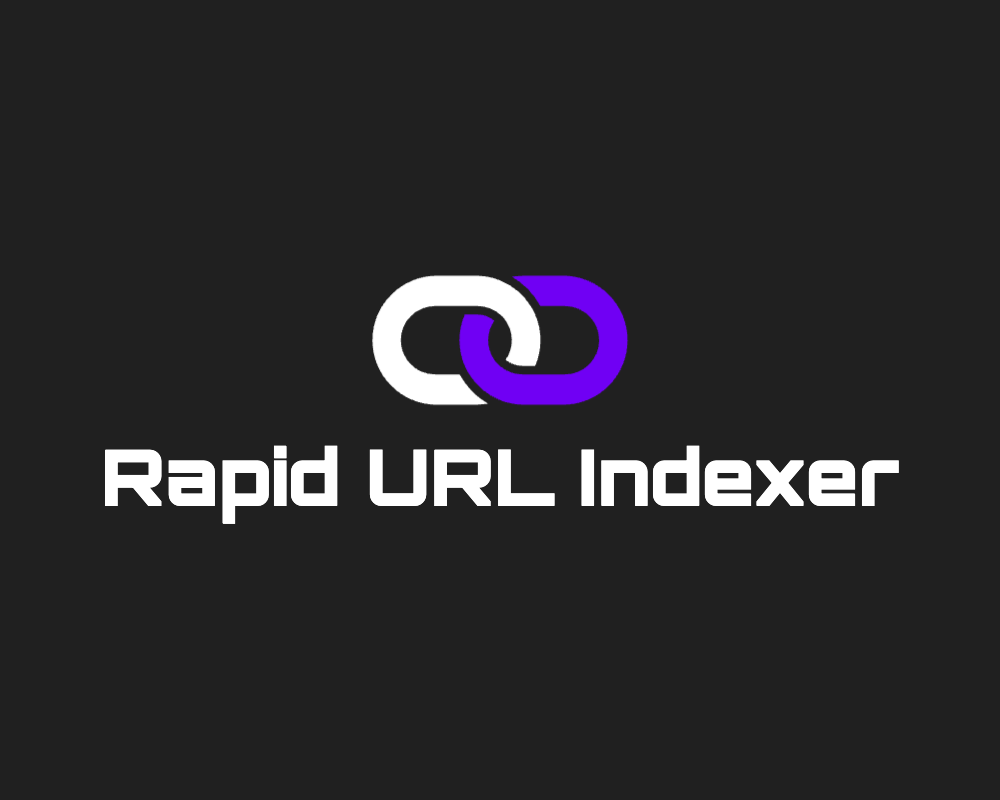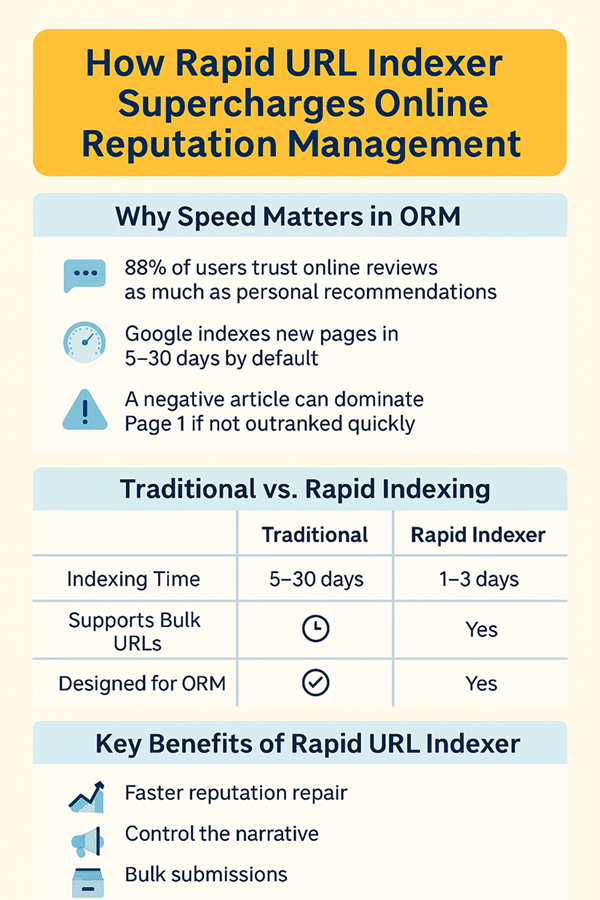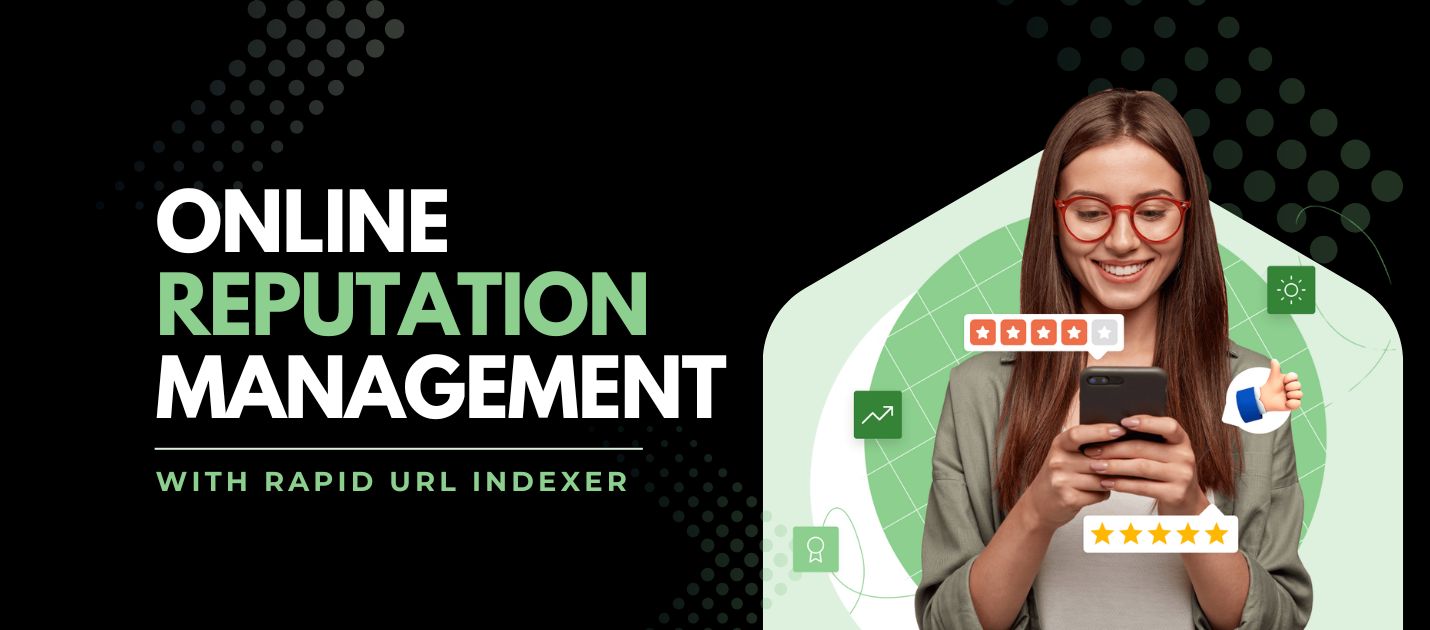When it comes to shaping how the world sees your brand, timing is everything. A single negative review or unflattering news article can dominate search results if you don’t act fast. That’s why online reputation management with rapid URL indexer has become a go-to strategy for marketers and entrepreneurs who care about their digital presence.
Let’s take a deep dive into how this tool works, how it fits into your ORM game plan, and why it might just be your brand’s best defense in the digital age.
Why Online Reputation Management Needs Speed?
Reputation management isn’t just about content creation — it’s about visibility. And in the world of search engines, visibility starts with indexing.
Every time you publish a blog, press release, or social profile, Google decides when and how to index it. This delay can create a serious problem if you’re trying to:
- Bury negative content
- Respond to a PR crisis
- Promote new positive press
- Improve brand sentiment quickly
A great ORM campaign that isn’t indexed fast is like a billboard no one drives past.
What is Rapid URL Indexer?

Rapid URL Indexer is a web-based tool that submits URLs directly to Google’s and Bing’s indexing systems. It uses various methods (including ping services, RSS submission, and third-party API calls) to notify search engines about your content.
How Does Rapid URL Indexer Work?
Here’s a breakdown of how the tool operates:
- Manual and bulk URL input: Paste or upload hundreds of links.
- Multiple indexing techniques: Utilizes safe pinging, Google APIs, and social triggers.
- Queue tracking: Monitor which URLs have been processed.
- Speed-focused backend: Designed to trigger indexing within 24–72 hours.
This isn’t magic. It’s about increasing your odds and speeding up the natural crawl process that could otherwise take weeks.
Why ORM with Rapid URL Indexer is a Game-Changer

Pairing ORM with rapid URL indexer can significantly enhance your reputation strategy, especially when time-sensitive issues arise.
Let’s say your brand is hit with a negative news story. Your team quickly creates a batch of positive content — blog posts, testimonials, media coverage. Without proper indexing, these pieces might not surface for weeks. During that time, the negative story dominates Page One.
By submitting all URLs through Rapid URL Indexer, you compress that waiting period — possibly down to hours. This lets your positive content compete for visibility immediately.
Key Benefits for ORM Campaigns
- Faster reputation repair: Index content faster than your competitors
- Control the narrative: Ensure timely content ranks quickly.
- Crisis response: Rapidly launch rebuttal articles or official statements.
- Boost brand assets: Index Google Sites, YouTube videos, PDFs, and more.
Is Rapid URL Indexer Effective for New Websites?
New domains often struggle with indexing. They lack backlinks, domain age, and authority — all things that delay Google’s interest. At this point, if you outsource link building agency, then the struggling phase might gone early.
A new brand or website can use the tool to:
- Launch branded pages across platforms
- Submit each page for immediate indexing
- Start building a visible reputation footprint quickly
In ORM, first impressions matter. This tool helps control your brand’s digital introduction.
Rapid URL Indexer vs. Traditional Indexing
| Feature | Traditional Indexing | Rapid URL Indexer |
| Indexing Time | 5–30 days | 1–3 days |
| Automation | Low | High |
| Supports Bulk URLs | No | Yes |
| Designed for ORM | No | Yes |
| Tracks Index Status | No | Yes |
| Helps New Domains | Limited | Strong |
As you can see, the advantages are clear — especially when speed and visibility are your top priorities.
What Users Say About It?
If you check rapid URL indexer reviews across forums and SEO communities, you must have found positive one’s the most.
Some reviews that users report:
- Noticeable improvements in indexing speed
- Easy-to-use interface
- Helpful for both old and fresh content
- Strong results for branded ORM efforts
Many agencies say the tool is a “set-it-and-forget-it” asset in their ORM workflow — freeing up time while ensuring visibility.
How Much Does Rapid URL Indexer Cost per URL?

Ok, now we have discussed the rapid URL indexer but how much does Rapid URL Indexer cost per URL?
Here’s a general breakdown:
- Entry Plan: $7–10/month (up to 100 URLs)
- Mid-Level Plan: $19–25/month (500+ URLs)
- High Volume Plan: $50+ (2,000+ URLs, for agencies)
That means the cost per URL can range from $0.01 to $0.05, depending on volume. When compared to lost brand trust or a delayed reputation response, it’s a cost-effective investment.
When Should You Use Rapid URL Indexer in ORM?
Use it when:
- You’ve just published branded content (interviews, articles, guest posts)
- You need to respond quickly to negative press
- You’re launching a personal branding campaign
- You’re trying to outrank old pages with updated ones
- You’re monitoring competitors and staying ahead
It’s not just a nice-to-have — it’s a must-have when timing is mission-critical.
Is Rapid URL Indexer Safe?
Yes — when used responsibly. It doesn’t use black-hat techniques or violate search engine guidelines. However, like any tool, it should be part of a broader strategy, not the only tactic.
Google still decides what gets indexed — this just gives your links the nudge they need to get noticed faster.
Should You Add It to Your Toolkit?
If you’re serious about online reputation management, this tool belongs in your strategy stack.
- It helps your positive content rank faster
- It’s affordable, scalable, and easy to use
- It boosts visibility for new brands and domains
- It acts as a defense tool during crisis or review attacks
Online reputation management with rapid URL indexer isn’t about shortcuts — it’s about strategic speed.
Want to discuss further about online reputation management further, reach out to Links Forge for further details.
